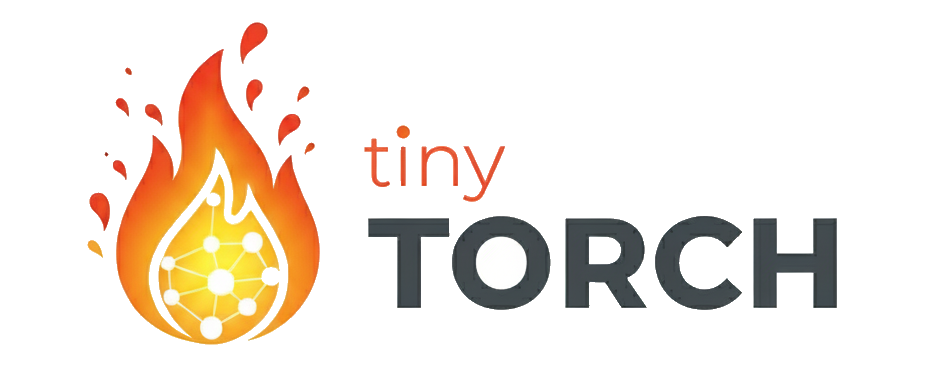🏆 TinyTorch Competitions#
Educational Challenges, Not Just Leaderboards#
TinyTorch competitions are planned educational challenges designed to deepen your understanding of ML systems through hands-on problem solving. These aren’t just about who gets the highest scores—they’re about learning systems engineering principles while building real ML systems.
The Educational Vision#
We’re designing competitions that teach you to think like an ML systems engineer:
Efficiency Mastery: Achieve accuracy targets within strict memory/compute constraints
Systems Understanding: Debug and optimize real bottlenecks in your implementations
Innovation Challenges: Solve problems using creative system design approaches
Collaborative Learning: Learn from others’ approaches while building your own solutions
Planned Competition Categories#
🎯 Accuracy Challenges
CIFAR-10 Sprint: First to achieve 75% accuracy using only your TinyTorch implementations
Efficient Training: Highest accuracy achieved within memory limits (256MB, 512MB, 1GB tiers)
Small Model Olympics: Best performance with parameter count restrictions
⚡ Performance Challenges
Speed Runs: Fastest training time to reach accuracy milestones
Memory Optimization: Lowest memory usage while maintaining target accuracy
Inference Efficiency: Fastest model inference on standard hardware
🛠️ Systems Mastery Challenges
Debugging Olympics: Identify and fix intentionally buggy implementations
Scaling Challenges: Optimize code for larger datasets and models
Hardware Awareness: Best use of CPU vectorization and cache efficiency
💡 Innovation Competitions
Creative Implementations: Most elegant solution to standard ML problems
Novel Optimizations: Discover new ways to improve training efficiency
Educational Tools: Build the best learning aids for future TinyTorch students
How Competitions Will Work#
Learning-First Design:
# Future CLI commands (in development)
tito compete list # See available challenges
tito compete join accuracy-sprint # Register for a challenge
tito compete submit --challenge=cifar10 # Submit your solution
tito compete results --detailed # See results with learning insights
What Makes These Different:
Detailed Analysis: Every submission gets performance profiling and optimization suggestions
Learning Resources: Access to hints, debugging guides, and optimization tutorials
Peer Review: Option to share your approach and learn from others’ solutions
Multiple Tiers: Challenges for beginners (20% accuracy) through experts (90%+)
Competition Timeline#
Phase 1: Foundation Building (Next 2-3 months)
Community feedback and competition design
Initial infrastructure development
Beta testing with volunteer participants
Phase 2: Soft Launch (3-4 months)
First “CIFAR-10 Efficiency Challenge”
Small group of participants (~20-50)
Rapid iteration based on feedback
Phase 3: Full Launch (4-6 months)
Multiple simultaneous competitions
Automated submission and scoring
Rich community features and collaboration tools
Educational Focus Areas#
Systems Engineering Skills:
Memory profiling and optimization techniques
Performance bottleneck identification
Scaling behavior analysis
Cache-efficient algorithm design
Real-World ML Engineering:
Production-ready code practices
Debugging distributed training issues
Resource constraint optimization
Hardware-aware implementations
Collaborative Problem Solving:
Code review and peer learning
Mentoring between experience levels
Team-based challenges for larger projects
Join the Design Process#
Help Us Build Better Competitions:
We want your input on what would make these competitions most valuable for learning:
What systems engineering skills do you want to develop?
What types of challenges would motivate you to participate?
How can we make competitions inclusive for all skill levels?
What would help you learn most from other participants’ approaches?
Current Discussion Topics:
Competition format and scoring criteria
Mentorship and collaboration features
Fair resource usage policies
Educational content integration
Share Your Ideas: GitHub Discussions - Competitions
What You Can Do Now#
🚧 While We Build This Feature
1. Practice Competition Skills:
# Use existing tools to prepare
tito checkpoint test 14 # Practice benchmarking skills
tito checkpoint test 13 # Test your kernel optimization knowledge
tito module complete 11_training # Master the training pipeline
2. Connect with Future Competitors:
Find training partners in GitHub Discussions
Share your current accuracy achievements
Ask for optimization tips and debugging help
Form study groups for collaborative learning
3. Build Your Competition Portfolio:
Track your CIFAR-10 accuracy improvements over time
Document your optimization techniques and learnings
Practice explaining your system design decisions
Build profiling and debugging skills
4. Share Your Training Journey:
Post milestone achievements (50%, 60%, 70%+ accuracy)
Share interesting bugs you’ve debugged
Explain optimization techniques you’ve discovered
Help others troubleshoot their implementations
🚀 Early Access Program
Want to be among the first to try TinyTorch competitions?
Join our beta testing group: We'll notify you when the first challenges are ready for testing
Join Beta Program →The Bigger Picture#
Why We’re Building This:
TinyTorch competitions aren’t about proving who’s the smartest—they’re about creating a community where everyone can push their understanding of ML systems engineering further. Whether you’re aiming for your first 30% accuracy or optimizing for 95%+, these challenges will help you think like a systems engineer.
Our Promise:
Educational value always comes first
Inclusive design for all skill levels
Honest timelines and realistic expectations
Community collaboration over individual competition
Real learning outcomes, not just leaderboard positions
The ultimate goal: Help you become the kind of ML engineer who can debug any training issue, optimize any bottleneck, and build systems that scale—skills you’ll use throughout your career.
